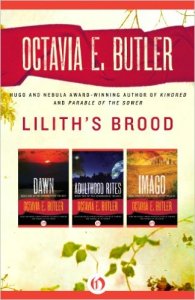These are my first impressions after reading The Sparrow by Mary Doria Russell (1996) in December 2011.
“…Because if I was led by God to love God, step by step, as it seemed, if I accept that the beauty and the rapture were real and true, then the rest of it was God’s will too, and that, gentlemen, is cause for bitterness. But if I am simply a deluded ape who took a lot of old folktales far too seriously, then I brought all this on myself and my companions and the whole business becomes farcical, doesn’t it. The problem with atheism, I find, under these circumstances,” he continued with academic exactitude, each word etched on the air with acid, “is that I have no one to despise but myself. If however, I choose to believe that God is vicious, then at least I have the solace of hating God.”
It’s hard to describe the exhilarating sense of emotion I felt while reading this book. I don’t consider myself a religious person, and this book is unquestionably about religion and our relationship with God. I am a spiritual seeker, though, and I found this novel to be one of the most meaningful examinations of our purpose as humans that I have ever read. It is not an easy read, and it offers no easy answers. But despite its horrors — and some truly horrific things happen in this story — it is a beautiful, life-affirming read.
I don’t want to reveal too much of the plot, because part of the joy of reading The Sparrow lies in discovering it. Russell parcels out the story in bits and pieces, to prepare the reader for what’s coming. So, just a bare-bones summary, then: a group of people discovers radio signals — recordings of beautiful singing — coming from the Alpha Centauri system. One of these people, Emilio Sandoz, is a Jesuit priest, who interprets the singing as a sign from God. He spearheads a Jesuit mission to travel to the planet of Rakhat, four light years away, and meet the Singers.
Russell tells the story of the expedition mainly in flashbacks, alternating with scenes set in the present, after Sandoz has been rescued from Rakhat, the only survivor of his mission, a broken and despairing man. This structure allows the story to unspool slowly. The reader knows that Sandoz’s ultimate experiences on Rakhat were horrific, that he loses everyone he cares about and is somehow brought to a state of utter degradation, but we don’t know exactly what happened to him (until the end), or why. We are seeking, like Sandoz, for the the meaning of suffering and loss, searching for God somewhere in the universe. Even though it concerns aliens and space travel, The Sparrow is a very human story, a quest that mirrors one of our first stories: the story of the Fall of humankind.
When Sandoz and his friends arrive on Rakhat, it is literally a Garden of Eden, and the aliens they encounter first are like the innocents before the Fall. But Russell doesn’t make it that easy for us. The fundamental mistake that the human visitors make is interpreting this alien world through a human worldview. Russell’s tale of first contact is meant to mirror Europeans’ first encounters with Native Americans. Early on, the narrative includes a historical account of a Jesuit priest who was tortured and mutilated by the Native Americans he tried to convert, was rescued, but returned to America to be recaptured and ultimately killed. This story mirrors Sandoz’s journey in many ways. He is not interacting with primitive humans, though, but with alien species that at a very basic level he does not understand. Russell does a terrific job of making these beings truly alien and showing how the humans’ failure to acknowledge their alienness leads to the downfall of the mission and irrevocable changes on Rakhat.
However, the humans are just as alien to the Rakhat natives, and through their eyes, Russell leads us to question our own sense of morality. Sandoz is judged harshly by almost everyone upon his return, and to me, this is one of the most distressing truths of the novel: the lack of compassion we show our own.
The Sparrow is a book of contrasts. The planet of Rakhat is both incredibly beautiful and the scene of almost unimaginable horrors. The human characters are good, intelligent, loving people, yet the novel doesn’t flinch from depicting humanity’s failings, most especially our capacity to misjudge, misinterpret and, even out of good intentions, make the worst mistakes. And while this story is full of God, it doesn’t definitively answer for the reader the question of what God is or whether God even exists. For its contrasts, its challenges and its beauty, I absolutely loved this book.

 Octavia Butler’s Xenogenesis novels were first compiled into one volume in 1989, but that compilation is now out of print. Grand Central Publishing has reissued the compilation in an attractive trade paperback to capture new readers. And I’m glad they did, because I probably wouldn’t have read these books otherwise.
Octavia Butler’s Xenogenesis novels were first compiled into one volume in 1989, but that compilation is now out of print. Grand Central Publishing has reissued the compilation in an attractive trade paperback to capture new readers. And I’m glad they did, because I probably wouldn’t have read these books otherwise.